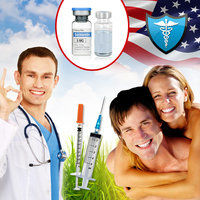Introduction to Low Testosterone
Low testosterone, medically known as hypogonadism, is a condition that affects a significant number of American men, particularly as they age. Testosterone is a crucial hormone responsible for male physical characteristics, muscle mass, bone density, and overall well-being. When levels drop below normal, it can lead to a variety of symptoms that can impact quality of life. This article aims to provide a detailed overview of the treatment options available to American men dealing with low testosterone.
Symptoms and Diagnosis
The symptoms of low testosterone can be subtle and may include decreased libido, fatigue, depression, and reduced muscle mass. It's essential for men experiencing these symptoms to consult with a healthcare provider for a proper diagnosis. Diagnosis typically involves a blood test to measure testosterone levels. If levels are consistently low, further tests may be conducted to determine the underlying cause, which could range from testicular injury to chronic diseases.
Treatment Options
1. Hormone Replacement Therapy (HRT)
Hormone Replacement Therapy is the most direct approach to treating low testosterone. It involves supplementing the body's testosterone levels through various methods, including injections, gels, patches, or pellets. Each method has its advantages and potential side effects, so it's crucial to discuss with a healthcare provider to determine the most suitable option.
Injections are typically administered every two to three weeks and can provide a significant boost in testosterone levels. Gels and patches, on the other hand, offer a more consistent daily dose, which some men find more convenient. Pellets, implanted under the skin, release testosterone slowly over several months.
2. Lifestyle Modifications
For men with mildly low testosterone levels, lifestyle changes can be an effective first step. Regular exercise, particularly strength training, can help boost testosterone levels naturally. Maintaining a healthy weight, managing stress, and ensuring adequate sleep are also crucial factors. A balanced diet rich in vitamins and minerals, such as vitamin D and zinc, can support healthy testosterone production.
3. Medications
In some cases, medications may be prescribed to address underlying conditions contributing to low testosterone. For instance, if a man has obesity-related hypogonadism, weight loss medications might be considered. Additionally, certain medications can stimulate the body's natural production of testosterone, such as clomiphene citrate, which is typically used to treat infertility but can also be effective for low testosterone.
4. Alternative Therapies
Some men may explore alternative therapies, such as herbal supplements like fenugreek or ashwagandha, which have been touted for their potential to boost testosterone levels. While some studies suggest these may have a mild effect, the evidence is not as robust as for conventional treatments. It's important to approach these options with caution and consult with a healthcare provider before starting any new supplement regimen.
Monitoring and Long-Term Management
Once a treatment plan is in place, regular monitoring is essential to ensure that testosterone levels are maintained within a healthy range and to manage any potential side effects. Blood tests every three to six months are typically recommended to assess hormone levels and adjust treatment as necessary.
Long-term management of low testosterone involves not only maintaining hormone levels but also addressing any underlying health issues that may contribute to the condition. Regular check-ups with a healthcare provider can help ensure that the treatment remains effective and safe over time.
Conclusion
Navigating low testosterone can be challenging, but with the right treatment and management plan, American men can improve their symptoms and quality of life. Whether through hormone replacement therapy, lifestyle changes, medications, or a combination of approaches, there are multiple paths to restoring healthy testosterone levels. It's crucial to work closely with a healthcare provider to find the most effective and safe treatment tailored to individual needs.
Contact Us For A Fast And Professional Response

- Environmental Toxins and Declining Testosterone Levels in American Men: A Growing Concern [Last Updated On: March 10th, 2025] [Originally Added On: March 10th, 2025]
- Chronic Illness and Low Testosterone in American Males: Impacts and Management Strategies [Last Updated On: March 17th, 2025] [Originally Added On: March 17th, 2025]
- Managing Low Testosterone in Aging Men: Symptoms, Causes, and Treatment Options [Last Updated On: March 19th, 2025] [Originally Added On: March 19th, 2025]
- Low Testosterone's Impact on Cognitive Function in American Men: Interventions and Insights [Last Updated On: March 19th, 2025] [Originally Added On: March 19th, 2025]
- Low Testosterone and Mood Disorders in American Men: A Comprehensive Overview [Last Updated On: March 19th, 2025] [Originally Added On: March 19th, 2025]
- Low Testosterone in American Males: Symptoms, Causes, and Management Strategies [Last Updated On: March 19th, 2025] [Originally Added On: March 19th, 2025]
- Vitamin D's Role in Managing Low Testosterone in American Men: Insights and Strategies [Last Updated On: March 19th, 2025] [Originally Added On: March 19th, 2025]
- Low Testosterone's Rising Economic Impact on American Healthcare [Last Updated On: March 19th, 2025] [Originally Added On: March 19th, 2025]
- Alcohol Consumption and Its Effects on Testosterone Levels in Men [Last Updated On: March 20th, 2025] [Originally Added On: March 20th, 2025]
- Low Testosterone in American Men: Symptoms, Diagnosis, and Treatment Options [Last Updated On: March 20th, 2025] [Originally Added On: March 20th, 2025]
- Low Testosterone: Impacts on Prostate Health and Cancer Risk in American Men [Last Updated On: March 20th, 2025] [Originally Added On: March 20th, 2025]
- Low Testosterone's Impact on Muscle Mass and Strength in American Males [Last Updated On: March 21st, 2025] [Originally Added On: March 21st, 2025]
- Low Testosterone's Impact on Skin Health in American Men: Causes and Management [Last Updated On: March 22nd, 2025] [Originally Added On: March 22nd, 2025]
- Smoking's Impact on Testosterone Levels in American Men: Health Risks and Quitting Strategies [Last Updated On: March 22nd, 2025] [Originally Added On: March 22nd, 2025]
- Low Testosterone and Diabetes: Managing Dual Health Challenges in American Males [Last Updated On: March 22nd, 2025] [Originally Added On: March 22nd, 2025]
- Low Testosterone's Impact on Immune Function in American Males: Insights and Management [Last Updated On: March 23rd, 2025] [Originally Added On: March 23rd, 2025]
- Common Medications Linked to Low Testosterone in American Men: Insights and Management [Last Updated On: March 23rd, 2025] [Originally Added On: March 23rd, 2025]
- Zinc's Role in Boosting Testosterone Levels in American Men [Last Updated On: March 23rd, 2025] [Originally Added On: March 23rd, 2025]
- Shift Work's Impact on Testosterone Levels in American Men: Insights and Strategies [Last Updated On: March 23rd, 2025] [Originally Added On: March 23rd, 2025]
- Low Testosterone and Osteoporosis Risk in American Males: Insights and Strategies [Last Updated On: March 23rd, 2025] [Originally Added On: March 23rd, 2025]
- Low Testosterone and Heart Disease Risk in American Men: Current Insights [Last Updated On: March 23rd, 2025] [Originally Added On: March 23rd, 2025]
- Weight Loss Boosts Testosterone: A Vital Strategy for American Males [Last Updated On: March 23rd, 2025] [Originally Added On: March 23rd, 2025]
- Low Testosterone: Symptoms, Impacts, and Treatment Options for American Men [Last Updated On: March 24th, 2025] [Originally Added On: March 24th, 2025]
- Low Testosterone in Aging Men: Symptoms, Diagnosis, and Treatment Options [Last Updated On: March 24th, 2025] [Originally Added On: March 24th, 2025]
- Chronic Stress and Testosterone: Impacts and Management Strategies for American Men [Last Updated On: March 24th, 2025] [Originally Added On: March 24th, 2025]
- Liver Health's Crucial Role in Managing Testosterone Levels for American Males [Last Updated On: March 24th, 2025] [Originally Added On: March 24th, 2025]
- Chronic Inflammation's Impact on Testosterone Levels in American Males: A Comprehensive Analysis [Last Updated On: March 25th, 2025] [Originally Added On: March 25th, 2025]
- Low Testosterone Linked to Increased Autoimmune Disease Risk in American Men [Last Updated On: March 25th, 2025] [Originally Added On: March 25th, 2025]
- Low Testosterone and Hair Loss in American Males: Mechanisms, Impacts, and Interventions [Last Updated On: March 25th, 2025] [Originally Added On: March 25th, 2025]
- Low Testosterone in American Males: Impact on Libido and Quality of Life [Last Updated On: March 25th, 2025] [Originally Added On: March 25th, 2025]
- Dietary Impact on Testosterone: Insights for American Men's Hormonal Health [Last Updated On: March 25th, 2025] [Originally Added On: March 25th, 2025]
- Herbal Supplements for Low Testosterone: Benefits, Limitations, and Key Herbs Reviewed [Last Updated On: March 25th, 2025] [Originally Added On: March 25th, 2025]
- Nutritional Deficiencies and Low Testosterone in American Males: Insights and Strategies [Last Updated On: March 26th, 2025] [Originally Added On: March 26th, 2025]
- Low Testosterone's Impact on Emotional Wellbeing in American Males: Symptoms and Solutions [Last Updated On: March 26th, 2025] [Originally Added On: March 26th, 2025]
- Low Testosterone and Depression in American Men: Links, Mechanisms, and Treatment Options [Last Updated On: March 26th, 2025] [Originally Added On: March 26th, 2025]
- Low Testosterone and Anemia: Impacts and Management in American Men [Last Updated On: March 26th, 2025] [Originally Added On: March 26th, 2025]
- Low Testosterone's Impact on American Males: Body Composition and Health Challenges [Last Updated On: March 26th, 2025] [Originally Added On: March 26th, 2025]
- Low Testosterone Linked to Dermatological Issues in American Men: A Comprehensive Overview [Last Updated On: March 26th, 2025] [Originally Added On: March 26th, 2025]
- Exercise Boosts Testosterone: A Guide for American Men [Last Updated On: March 26th, 2025] [Originally Added On: March 26th, 2025]
- Low Testosterone and Metabolic Syndrome: Risks and Prevention in American Men [Last Updated On: March 26th, 2025] [Originally Added On: March 26th, 2025]
- Genetic Factors Influencing Low Testosterone in American Males: A Comprehensive Overview [Last Updated On: March 27th, 2025] [Originally Added On: March 27th, 2025]
- Low Testosterone Linked to Neurological Risks in American Men: Implications and Interventions [Last Updated On: March 27th, 2025] [Originally Added On: March 27th, 2025]
- Low Testosterone and Thyroid Disorders: Impact and Management in American Men [Last Updated On: March 27th, 2025] [Originally Added On: March 27th, 2025]
- Sleep Apnea's Impact on Testosterone Levels in American Males: A Comprehensive Analysis [Last Updated On: March 27th, 2025] [Originally Added On: March 27th, 2025]
- Low Testosterone Linked to Increased Kidney Disease Risk in American Men [Last Updated On: March 27th, 2025] [Originally Added On: March 27th, 2025]
- Hormonal Imbalance and Low Testosterone: Causes, Symptoms, and Treatment in American Males [Last Updated On: March 28th, 2025] [Originally Added On: March 28th, 2025]
- Low Testosterone and Insulin Resistance: Impact and Management in American Men [Last Updated On: March 28th, 2025] [Originally Added On: March 28th, 2025]
- Environmental Estrogens and Their Impact on Testosterone Levels in American Males [Last Updated On: March 28th, 2025] [Originally Added On: March 28th, 2025]
- Chronic Pain's Impact on Testosterone Levels in American Males: Management Strategies [Last Updated On: March 28th, 2025] [Originally Added On: March 28th, 2025]
- Dental Health's Role in Managing Low Testosterone in American Males [Last Updated On: March 28th, 2025] [Originally Added On: March 28th, 2025]
- Gut Health and Testosterone: Optimizing GI Function for Hormonal Balance in American Men [Last Updated On: March 29th, 2025] [Originally Added On: March 29th, 2025]
- Respiratory Health's Impact on Testosterone Levels in American Males [Last Updated On: March 30th, 2025] [Originally Added On: March 30th, 2025]
- ENT Health's Crucial Role in Managing Testosterone Levels in American Males [Last Updated On: April 1st, 2025] [Originally Added On: April 1st, 2025]
- Low Testosterone's Impact on Musculoskeletal Health in American Men: Risks and Interventions [Last Updated On: April 2nd, 2025] [Originally Added On: April 2nd, 2025]
- Low Testosterone Linked to Eye Disorders in American Men: Emerging Evidence and Implications [Last Updated On: April 3rd, 2025] [Originally Added On: April 3rd, 2025]
- Reproductive Health and Testosterone: Impacts and Management in American Males [Last Updated On: April 4th, 2025] [Originally Added On: April 4th, 2025]
- Low Testosterone Levels Increase Infectious Disease Risk in American Men: Current Insights [Last Updated On: April 6th, 2025] [Originally Added On: April 6th, 2025]
- Immunological Health's Impact on Testosterone Levels in American Males: A Comprehensive Analysis [Last Updated On: April 6th, 2025] [Originally Added On: April 6th, 2025]
- Low Testosterone and Urological Health Risks in American Men: Detection and Management [Last Updated On: April 7th, 2025] [Originally Added On: April 7th, 2025]
- Testosterone and Endocrine Health: Diagnosis, Treatment, and Monitoring in American Males [Last Updated On: April 7th, 2025] [Originally Added On: April 7th, 2025]
- Cancer's Impact on Testosterone Levels in American Men: Causes and Management Strategies [Last Updated On: April 8th, 2025] [Originally Added On: April 8th, 2025]
- Low Testosterone Linked to Increased Risk of Hematological Disorders in American Men [Last Updated On: April 10th, 2025] [Originally Added On: April 10th, 2025]
- Low Testosterone Linked to Increased Psychiatric Disorder Risk in American Men [Last Updated On: April 10th, 2025] [Originally Added On: April 10th, 2025]
- Wound Healing's Impact on Testosterone Levels in American Males [Last Updated On: April 11th, 2025] [Originally Added On: April 11th, 2025]
- Low Testosterone in American Men: Impacts on Surgical Complications and Mitigation Strategies [Last Updated On: April 11th, 2025] [Originally Added On: April 11th, 2025]
- Rheumatological Health and Low Testosterone Management in American Males: Strategies and Insights [Last Updated On: April 12th, 2025] [Originally Added On: April 12th, 2025]
- Trauma's Impact on Testosterone Levels in American Males: Causes, Effects, and Management [Last Updated On: April 13th, 2025] [Originally Added On: April 13th, 2025]
- Low Testosterone and Vascular Health Risks in American Men: Detection and Management [Last Updated On: April 14th, 2025] [Originally Added On: April 14th, 2025]
- Low Testosterone and Genetic Disorders: Risks and Prevention Strategies for American Men [Last Updated On: April 15th, 2025] [Originally Added On: April 15th, 2025]
- Prenatal Health's Impact on Testosterone Levels in American Males: Nutrition, Stress, and Environment [Last Updated On: April 15th, 2025] [Originally Added On: April 15th, 2025]
- Low Testosterone in American Men Linked to Pediatric Disorders in Offspring [Last Updated On: April 16th, 2025] [Originally Added On: April 16th, 2025]
- Low Testosterone Linked to Increased Allergy Risk in American Men: Insights and Prevention [Last Updated On: April 16th, 2025] [Originally Added On: April 16th, 2025]
- Occupational Health's Impact on Testosterone Levels in American Males [Last Updated On: April 16th, 2025] [Originally Added On: April 16th, 2025]
- Developmental Health's Impact on Testosterone Levels in American Males [Last Updated On: April 17th, 2025] [Originally Added On: April 17th, 2025]
- Low Testosterone and Congenital Disorders in American Men: Risks and Management Strategies [Last Updated On: April 18th, 2025] [Originally Added On: April 18th, 2025]
- Anesthetics' Impact on Testosterone Levels in American Males: Management Strategies [Last Updated On: April 18th, 2025] [Originally Added On: April 18th, 2025]
- Low Testosterone in Aging Men: Risks and Management Strategies [Last Updated On: April 19th, 2025] [Originally Added On: April 19th, 2025]
- Neonatal Health Impacts Testosterone Levels in American Males: Understanding Low T [Last Updated On: April 20th, 2025] [Originally Added On: April 20th, 2025]
- Public Health Policies and Their Impact on Managing Low Testosterone in American Men [Last Updated On: April 20th, 2025] [Originally Added On: April 20th, 2025]
- Low Testosterone in American Men: Environmental Toxins, Lifestyle, and Health Advocacy [Last Updated On: April 21st, 2025] [Originally Added On: April 21st, 2025]

















